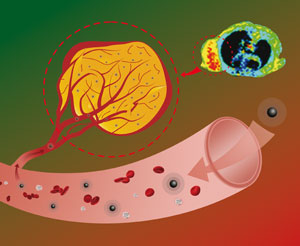A new highly sensitive nanoparticle contrast agent for imaging in the body stays in the bloodstream longer and is better at targeting tumours than other nanoparticle contrast agents, say Chinese scientists.

The smaller nanoparticles stay in the bloodstream longer because they don’t accumulate in the liver as quickly as larger nanoparticles
Xintao Shuai from Sun Yat-Sen University, Guangzhou,and colleagues encapsulated individual – or nonclustered – superparamagnetic iron oxide nanoparticles inside micelles composed of folate and a polymer.
The team injected the nanoparticles into the veins of mice tails and followed their progress with magnetic resonance imaging (MRI). They found that the micelles increased the nanoparticles’ ability to show the bright and dark contrast between healthy and diseased tissue. The nanoparticles stayed in the bloodstream longer than larger nanoparticles because it took longer for them to accumulate in the liver. By introducing folate, the nanoparticles’ ability to target tumour cells was also increased.
To view the full Chemistry World article, please click here: Small and sensitive nanoparticles
Link to journal article
Nonclustered magnetite nanoparticle encapsulated biodegradable polymeric micelles with enhanced properties for in vivo tumor imaging
Du Cheng, Guobin Hong, Weiwei Wang, Renxu Yuan, Hua Ai, Jun Shen, Biling Liang, Jinming Gao and Xintao Shuai, J. Mater. Chem., 2011
DOI: 10.1039/c0jm03783d










